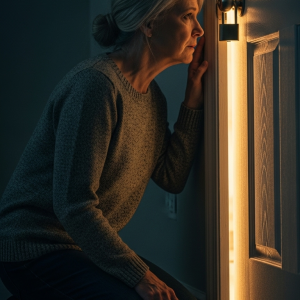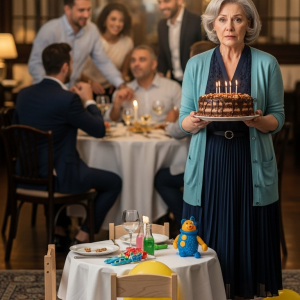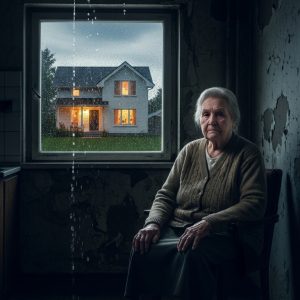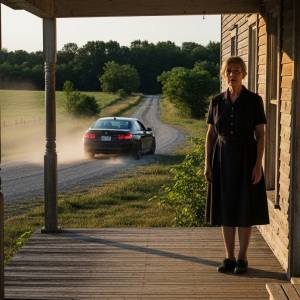I still remember the exact moment my heart finally turned to stone. It’s funny how, after decades of disappointments, it was something so small that pushed me over the edge. But that’s how it often happens. A lifetime of silent sacrifice, and then one day, one moment, one sentence, and everything just breaks.
My name is Elizabeth Harmon. Most people call me Ellie, though my daughter, Cassandra—”Cassie”—hasn’t called me anything in almost two years. Not until the invitation arrived.
I live alone in a modest house in Deer Creek, the same house where I raised Cassie and her brother, Michael, after their father walked out. It’s quieter now. The walls that once echoed with laughter now just hold the ticking of a clock and the purr of my old cat, Churchill.
The invitation arrived on a Tuesday, embossed with silver foil. You’re invited to celebrate the upcoming arrival of baby boy Reynolds. Two years of silence, and now this. Not a phone call, not a coffee date, just a formal invitation to a baby shower for a grandchild I didn’t know existed.
A small voice whispered that maybe this was an olive branch. That small voice had been wrong many times before. But hope is a stubborn thing.
I called Michael first, my son, the peacemaker. He always said he was stuck in the middle but always ended up on his sister’s side.
“Mom, you should go,” he said, his voice careful. “Pregnancy has softened her. She talks about you sometimes.”
“What does she say?” I asked, trying not to sound too eager.
After a pause, he said, “She says she misses the way things used to be.”
I didn’t point out that “the way things used to be” meant me co-signing for her failed business, leaving me with $40,000 of debt. Or me working double shifts while she lived with me, rent-free, after her first divorce. Instead, I just said, “I miss her, too.”
I spent $300 I couldn’t spare on a cashmere baby blanket. I had my hair done. I bought a new dress. I practiced what I would say, determined to leave the past behind.
The baby shower was at a vineyard, in a renovated barn glowing with string lights. I saw Michael and his wife, Lisa, deep in conversation with Cassie’s in-laws. They didn’t see me arrive.
Cassie was radiant in a flowing white dress, her stomach a perfect round globe. She saw me, and for a moment, her smile faltered. She accepted my hug with a stiff one of her own.
“You came,” she said, not quite meeting my eyes.
“Of course,” I replied. “You look beautiful.”
She nodded, already looking around the room for an escape. “Thanks. There’s food over there. I should get back to greeting people.” And she was gone, swallowed by a circle of friends.
I found a seat at a back table and placed my gift on a table already overflowing with packages. An hour passed. I watched as Cassie opened gifts, exclaiming over tiny outfits. My gift remained untouched.
Then, it was time for speeches. James, her husband, went first. Then Lisa read a poem about motherhood, never once looking my way. Finally, Cassie stood, one hand on her belly.
“I want to thank all of you for being here,” she began, her voice carrying through the barn. “It means everything.”
She turned slightly, looking at an elegant woman in her sixties with perfectly coiffed silver hair. It was Patricia Reynolds, James’s mother.
“But I especially want to thank someone who has been a guiding light for me,” Cassie continued, her voice thick with emotion. “Someone who showed me what true motherhood looks like. Patient, understanding, and unconditional.”
My chest tightened. Was this it? The moment of reconciliation?
“Patricia,” Cassie said, raising her glass. “This is for you. This is the woman I wish had raised me. She will be the one and only true grandmother to my child.”
The room erupted in applause. Patricia stood, wiping away tears as she embraced my daughter. Michael was clapping too, his eyes carefully avoiding my corner of the room. I sat frozen, my water glass trembling in my hand.
No one noticed when I stood. No one noticed when I walked out, leaving the expensive blanket behind. I sat in my car, hands gripping the steering wheel, not crying. Something was happening inside me, something cold and clarifying, like ice water being poured down my spine.
Every slight, every sacrifice, every excuse I had ever made for them crystallized into a single, sharp point of understanding. I had been a fool.
I drove home in a state of calm that should have frightened me. That night, I made three phone calls: to my attorney, to a private investigator, and to a storage facility.
By the time the sun rose, I had packed several boxes. Old photo albums, baby books, school awards—thirty years of memories. I wasn’t just a mother anymore. I was someone else now.
When Michael called, I told him I’d left the party because I felt ill. He sounded relieved. “Well,” he said, “Cassie wanted to thank you for the blanket. It was really nice.”
“I’m glad she liked it,” I said, my voice pleasant and empty.
“Listen, Mom. What Cassie said about Patricia… you know how she gets. She didn’t mean it.”
“It’s fine, Michael,” I said. “Truly. I understand perfectly now.” And for the first time, I did.
The first package arrived at Cassie’s door one week later, with a signature required. Inside was a leather-bound book embossed in gold: Financial Records: Cassandra Reynolds, 2015-2023. It was a meticulous accounting of every dollar I had ever given her, totaling over $157,000.
Her call came that afternoon. “What the hell is this?” she shrieked.
“Hello, Cassandra. I assume you received my gift.”
“A gift? What are you trying to prove? That I owe you for being my mother?”
“Not at all,” I said calmly. “Consider it a family legacy. A history of generosity for you to pass down to your son.”
“You’re unbelievable!” she spat.
“Before you go,” I said, my voice still pleasant, “you might want to tell Michael to check his mail tomorrow.”
Michael’s package contained his own financial records, along with printed copies of texts and emails between him and his sister about me. Frank Delaney, my investigator, was very good at his job.
“Mom, what are you doing?” he asked that evening, his voice low and controlled.
“Hello, Michael. Did you receive something interesting?”
A long pause. “This isn’t like you.”
“And what am I like, Michael?”
“You’re forgiving. You don’t hold grudges.”
“And how has that worked out for me?” I asked, stirring the soup I was making. “This isn’t about the shower, Michael. It’s about two decades of taking while I kept giving. It’s about you telling your wife I’m ’emotionally draining.’ It’s about Cassie borrowing money she never intended to repay.”
“So what do you want? An apology?”
“It’s far too late for apologies,” I said. “This is consequence, Michael. This is what happens when people mistake kindness for weakness for too long.”
“Are you threatening us?”
“Not at all. I’m simply informing you of a change. There will be two more deliveries. Then we’ll be done.”
The next day, identical envelopes arrived at their homes. Inside was my new will. My estate—the house, my savings, my life insurance—was now to be divided between the local animal shelter and a scholarship fund for single mothers. A small trust was set aside for any grandchildren who sought contact with me after turning eighteen. Nothing for Cassie. Nothing for Michael.
Cassie called, screaming. I let it go to voicemail.
The final packages were larger boxes. They contained all their childhood photo albums, baby books, and school awards, with one crucial alteration. Everywhere my name had been, it was now carefully replaced with “Patricia Reynolds.” I had erased myself from their history and replaced myself with the mother they wanted.
They arrived at my door three hours later.
“How could you do this?” Cassie demanded, her face blotchy with tears. “These are our memories.”
“Are they?” I asked calmly. “I thought you’d prefer Patricia in them.”
I let them into my living room, now bare of their photos. “What I’ve done,” I said, “is honor your wishes.”
“This is sick! It’s manipulative!” Cassie spat.
“Is it?” I asked. “You stand before a room of people and publicly reject your own mother, and that’s not sick? That’s not manipulative?”
Michael stepped between us. “Mom, what Cassie said was wrong. But this is not the way to handle it.”
“And what is the way, Michael? Should I have cried? Begged for my daughter’s love?”
He had no answer.
“So what’s the endgame here, Mom?” he asked. “What do you want from us?”
“Nothing,” I said, and I meant it. “I want absolutely nothing from either of you. That’s the point. I’ve spent decades wanting your time, your respect, your consideration. I’m done wanting.”
Cassie’s hand went to her pregnant belly. “So you’re just canceling us? Your own children? Your grandchild?”
“I’m not canceling anyone,” I corrected her. “I’m accepting the reality you created. In that reality, I am not a mother worthy of respect, nor a grandmother who deserves to know her grandchild.”
I handed Michael a folder with printouts of his texts. “You call me needy. Hard to be around.” I handed Cassie a similar folder. “You mock my clothes and tell friends I’m only good for loans.”
“You spied on us!” Cassie cried.
“So is fraud,” I replied evenly, “which you committed when you used my credit card for a spa weekend without my knowledge.”
I sat down, suddenly weary. “I don’t expect you to understand. What I do expect is for you to leave my home now and to respect the boundaries I’ve established. I will not be attending family functions. I will not be lending money. I will be living my life for myself.”
“You’ll regret this,” Cassie said, her voice hard.
I looked at the daughter I had carried, raised, and loved. “I have many regrets, Cassandra,” I said quietly. “Loving you too much to set boundaries. Excusing behavior I would never tolerate from anyone else. But this moment, right here, will never be one of them.”
I opened the front door. “Goodbye.”
Three months passed. I settled into new rhythms: volunteering, gardening, making new friends. I waited for regret to come. It never did. Instead, something that felt remarkably like peace bloomed in its place.
One evening, my doorbell rang. It was James, Cassie’s husband.
“Mrs. Harmon,” he said, looking uncomfortable. “Cassie doesn’t know I’m here.”
“Then why are you here, James?”
He sighed. “Because she’s miserable. She cries all the time. Her blood pressure is up. She made a mistake. What she said at the shower was cruel. She knows it was wrong.”
“And yet, she’s not the one standing here.”
“She’s afraid,” he said simply. “And hurt, and angry too. What I’m asking is… come to the hospital when the baby is born. Be part of your grandson’s life. Let her apologize. Start fresh.”
I almost laughed. “And if I refuse?”
“But he’s your grandson,” James said, confused. “Your family.”
“Just as Cassie is my daughter,” I replied. “That connection didn’t stop her from treating me with contempt. Relationships, even family ones, require reciprocity and respect. For too long, I accepted scraps. I was wrong.”
“So that’s it? You’re just done with them?”
“I’m done with one-sided relationships,” I clarified. “The baby is innocent, yes. And when he is old enough to seek me out on his own, I will welcome him. My will provides for him directly.”
James looked defeated. “For what it’s worth,” he said at the door, “I’ve always respected you, Mrs. Harmon.”
“Thank you, James,” I said. “I hope you’ll be a better parent than your wife has been a daughter.”
Two years passed. I sold my house and bought a smaller place by the lake. I heard through the grapevine that Michael had been passed over for a promotion and that Cassie and James were struggling financially. The news didn’t stir me.
Then I heard that Patricia Reynolds had died.
Three days later, Michael was at my door. “Mom,” he said, looking older than his years. “The funeral’s tomorrow. Cassie’s a mess. She needs her mother. Her real mother.”
The irony was rich. “Does she? The same mother she publicly wished she never had?”
“She was wrong. We were both wrong,” he pleaded.
“When your father left,” I said quietly, “I grieved. I was terrified. Did either of you consider my grief then? Or any of the times after?”
He looked away. “That was different.”
“How? Because my pain was inconvenient?” I turned back to the roses I was planting. “Cassie made her choice. Patricia was her mother. Now she has lost that mother. I am sorry for her pain. But I am not a backup plan.”
He stood there for a long moment. “There’s something else. James left Cassie three months ago. He has custody of Alex. The business is bankrupt. Patricia was helping her financially, and now that’s gone too.”
I felt a flicker of something, then ruthlessly crushed it. “I’m sorry to hear that,” I said, and I meant it. “But Cassie is an adult. She’ll have to find her way, just as I did.”
“So that’s it? ‘Sorry to hear that’?”
“Biology doesn’t erase behavior, Michael,” I said. “It doesn’t entitle anyone to unlimited chances to inflict pain without consequence.”
“What about forgiveness?” he asked. “Isn’t that what mothers do?”
“Forgiveness requires genuine remorse and changed behavior,” I said, brushing the dirt from my gloves. “Without those, it’s not forgiveness. It’s permission. Permission to continue treating someone as disposable.”
He stared at me, perhaps truly seeing me for the first time. “You’ve changed.”
“No,” I corrected him. “I’ve simply stopped pretending to be someone I’m not. Someone who would accept crumbs of respect in exchange for unconditional love.”
“How do we fix this?” he asked, his voice small.
“That’s the point, Michael. You don’t. Some things, once broken, stay broken. You learn to live with the consequences of your actions.”
I wished him and Cassie well, but from a distance. The next day, as Patricia Reynolds was laid to rest, I walked among exotic flowers at a botanical garden two hours away. I felt no guilt, no regret. What I felt was peace.
My children had made their choices. I had made mine. In doing so, I had finally become the mother they deserved—one who taught them, through unyielding consequence, that respect is not optional. It was perhaps the most important lesson I would ever teach them. Whether they learned it or not was beyond my control. But I had finally learned it myself, and that was more than enough.




